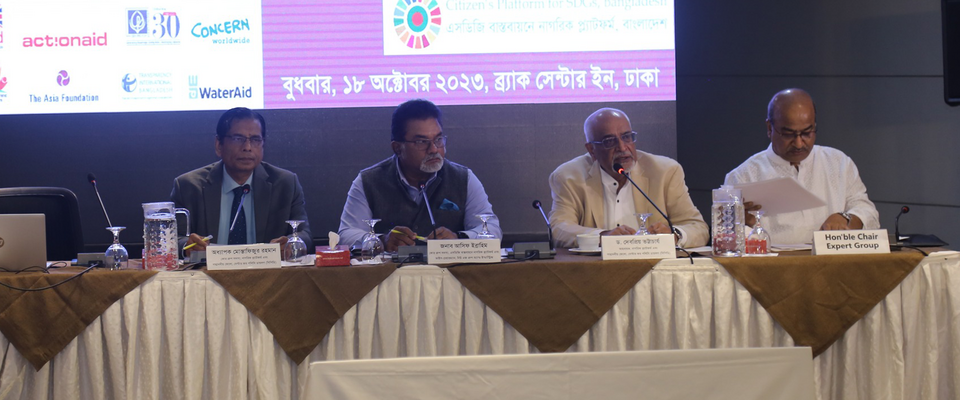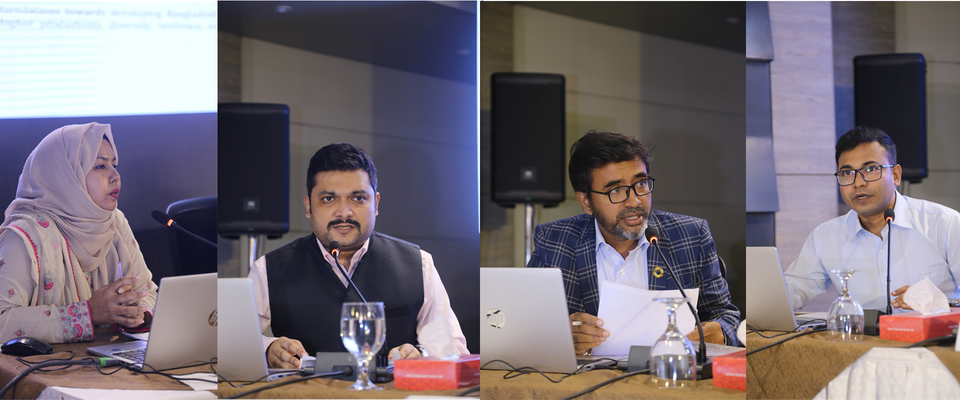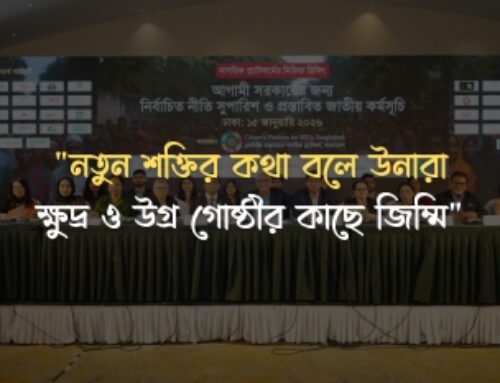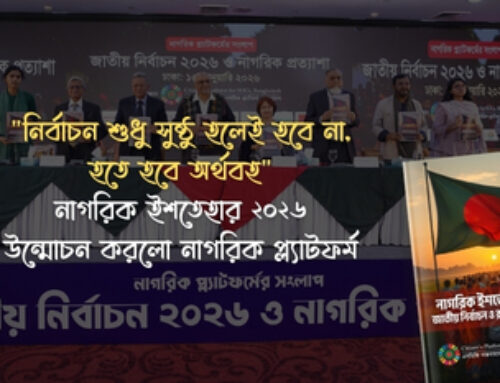
Bangladesh’s current developments are limited to average economic growth and per capita income. However, Citizen’s Platform’s observations made throughout 2022 in various districts of the country revealed significant disparities and deviations from these averages and parallel truth of Bangladesh’s development narrative.
Marginalised communities and those left behind for decades have been excluded from the benefits of development. Various groups, including youth, children, women, the elderly, indigenous communities, people in haor or coastal regions, and individuals with disabilities, face significant challenges in adapting necessary advancements, which pose ongoing risks to their well-being.
These observations were stated by Dr Debapriya Bhattacharya, Convenor, Citizen’s Platform for SDGs, Bangladesh and Distinguished Fellow, Centre for Policy Dialogue (CPD) at the media briefing titled “Civil Agenda for Inclusive Development and Equity: Agriculture, Employment, Unplanned Urbanisation and Public Services, and Clean and Affordable Energy”. The briefing was held on Wednesday, October 18, 2023, at the BRAC Centre Inn Auditorium, Mohakhali, Dhaka.
The event was organised by the Citizen’s Platform in association with UKAid Bangladesh, ActionAid Bangladesh, Centre for Policy Dialogue (CPD), Concern Worldwide, Manusher Jonno Foundation, The Asia Foundation, Transparency International Bangladesh (TIB) and WaterAid Bangladesh.
Mr Asif Ibrahim, Core Group Member, Citizen’s Platform and Vice-Chairman, New Age Group and Industries presided over the briefing.
Four presentations were presented by distinguished speakers from specific fields who dedicatedly worked on the issues along with the team. Ms Jinnat Ara, PhD, Research Fellow, Bangladesh Institute of Development Studies (BIDS), Mr Tanvir Sobhan, Senior Lecturer, Department of Economics and Social Sciences, BRAC University, Dr Shanawez Hossain, Assistant Professor, Department of Global Studies and Governance (GSG), Independent University, Bangladesh (IUB) and Dr. Sakib Bin Amin, Associate Professor, Department of Economics, North South University presented on selected topics.
Professor Mustafizur Rahman, Distinguished Fellow, CPD and core group member, Citizen’s Platform led the session. Issue-based experts were hired to research the topics and an inclusive team was formed, he added. He proudly acclaimed that the team had worked without any honorarium i.e. they gave their “labour of love”.
He further added that economic development is not possible without the participation of left-behind communities of the country. Our policymakers must consider this fact. If someone falls behind in this development process, they will hinder the future development process.

On the agricultural issue, Ms Jinnat Ara suggested to improve the lives of the left behind communities and marginalised groups is to support the growth of agriculture. She discussed core challenges and recommended productivity-driven diversification, inclusive access to proper information for all farmers equal facilities for women farmers and collaboration between government and private sectors.
Regarding employment issue, Mr Tanvir Sobhan commented that high unemployment and underdevelopment is the main obstacle in the employment sector. He recommended aligning education with the labour market and referred to the TVET model that ensures a skilled workforce with industry demands. Other recommendations were promoting entrepreneurship, modernizing agriculture, establishing a National Entrepreneurship Fund, promoting learning and training on coding and digital literacy from childhood, and implementing regulations to protect the rights of migrant workers.
Dr Shanawez Hossain shared insights on unplanned urbanisation and stated with grief that one lac thirty-five thousand crore has been spent in the development of Bangladesh in the last decade but it has not been inclusive, safe and resilient. He highlighted the need to strengthen local government institutions, amend laws and policies to ensure urban people’s rights to public services, ensure proper decentralisation and devolution of power and integrate the Sustainable Development Goals (SDGs) into urban planning. He stressed that to mitigate any issue often we adopt an ad-hock system rather we should go for the master plan.
Dr. Sakib Bin Amin, presented on the topic of clean energy. In his speech, he claimed clean energy is said to be the lifeblood of any economy. He addressed the challenges related to demand-supply imbalance, monofuel dependency, and rural-urban inequality. He called for strengthening organizations like Bapex and Petrobangla, revising policy frameworks for energy justice, prioritising the development of domestic natural gas, and minimizing political influence in the energy sector. Last but not least, manpower needs to be used properly.
Following the speaker presentations, Dr Debapriya Bhattacharya opened the floor for media.

Answering one of the questions, Dr. Mustafizur Rahman said that our policy brief issues were very narrowed down to specific issues so the broad Delta Plan was not accommodated in it. Rather than that, there are no hard feelings for the project.
Dr Debapriya addressed the questions of the media on the labour market and said we still lack enough skilled labour. There are four trends in the labour market. Firstly, in agriculture, there exists a repressive culture where women are more into agriculture and they are given less wages than male farmers. Secondly, the contribution of the industry has been increased and the number of workers has been lessened. Thirdly, the informal transition has taken place due to a lack of workers. Fourthly, most of the employment opportunities are taking place in foreign, rather than in one’s nation. In modern society, lower-income labour is the picture of a middle-income country, he added.
In answering one of the questions Mr Nabinur Rahman, Concern Worldwide said that in our megacity Dhaka, many floating communities lack proper identification and documents for NID. Special provisions can be made for them. Mr Asif Ibrahim expressed optimism regarding the opening of a commodity exchange in Chittagong, hoping for benefits similar to those observed in neighbouring India, when addressing trade-related questions.
The briefing concluded with thanks to the journalists and guests in attendance.





Leave A Comment